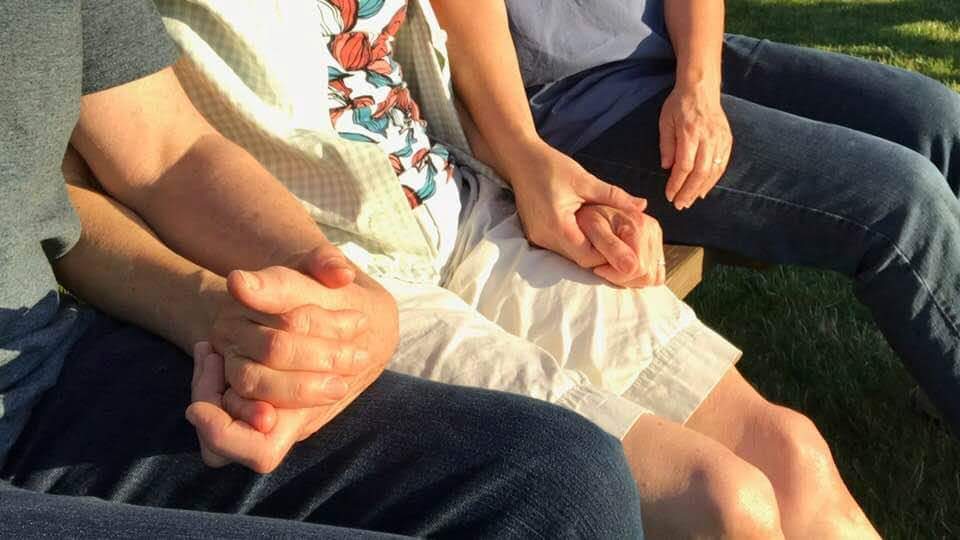|
Thoughts on Matthew 5:21-37 Adapted from my message at St. David of Wales Episcopal Church February 16, 2020 Have you ever been to a retreat or conference or read a book where the presenter or author speaks or writes in ways that “blow your mind?” Their words expand your thinking, open you to new ways of understanding life and its struggles, as well as purpose and you’re inspired to take this learning and incorporate it into your daily life? It’s what we sometimes call a “mountain top experience” and that’s what happened to the disciples who followed Jesus up onto Mt. Sinai for The Sermon on the Mount. Jesus’ teachings from the encounter comprise Chapters 5 through 7 of Matthew’s Gospel and begin with famous Beatitudes. “Blessed are they who…” These first verses weren’t in the Episcopal Sunday lectionary readings this month since we observed Jesus’ dedication in the temple on the first Sunday of February. But last Sunday our gospel reading included verses 13 through 20 of Chapter 5, and Fr. Steve, the priest at St. David's presented the heart of those verses. To paraphrase him: “You are salt and light and stardust. You come from love, live in love, and will return to love. Your worth is in being; not doing. You are beloved simply because you exist.” As the priest spoke, a glimmer of sun shone through the stained glass windows up in the choir loft casting a tiny rainbow on my bulletin and I soaked in the beautiful truth of being God’s beloved, having a mini-mountaintop experience. After worship, instead of floating off on a cloud to the top of Mt. Rainier, I stood in line for a potluck lunch and sat down for our annual meeting reporting the business of church, affirming those who are leading, and dusting off our rusty recollections of Robert’s Rules of Order. Eventually, we have to come down from the mountain and live our lives. Jesus knew this, and he didn’t stop with metaphors of salt and light. He got down to brass tacks as it were, reminding his companions that he didn’t come to abolish the law or the prophets, but to fulfill them. We need rules and order. But if we are to live as God’s beloved, we need to live by more than the law—beyond the law, but not above it—as Jesus makes clear in today’s lesson. In four different examples, Jesus opens with “You’ve heard it said,” and quotes the law. Then he continues, “but I say…” going beyond the letter of the law to the spirit behind it. Jesus said, “You have heard that it was said to those of ancient times, ‘You shall not murder’; and ‘whoever murders shall be liable to judgment.’ But I say to you that if you are angry with a brother or sister, you will be liable to judgment; and if you insult a brother or sister, you will be liable to the council; and if you say, ‘You fool,’ you will be liable to the hell of fire. Certainly, we shouldn’t kill one another. But if we are to live as God’s beloved, our concern for each other must extend far beyond refraining from fatal violence. We are called to not only avoid physical violence, but to control our emotions, to put aside our anger, even when we believe it’s righteous. And I have a feeling that might’ve been easier in Jesus’ day when people only moved as fast as their feet could carry them, instead of hurtling down freeways at 60 or 70 mph, forgetting there are humans behind steering wheels. We’re called to deny our desire for revenge against those who’ve wronged us, in our perceptions as well as in fact, and to employ our best efforts at conflict resolution. [W]hen you are offering your gift at the altar, if you remember that your brother or sister has something against you, leave your gift there before the altar and go; first be reconciled to your brother or sister, and then come and offer your gift. Come to terms quickly with your accuser while you are on the way to court with him, or your accuser may hand you over to the judge, and the judge to the guard, and you will be thrown into prison. Truly I tell you, you will never get out until you have paid the last penny. After worship few weeks ago, a parishioner shared her experience as a nurse in the prison system. She talked about how sentences are computed, time subtracted for good behavior, added in other situations, how in some form or another every day must be served. “Prison isn’t for rehabilitation,” she said, “it’s to keep the public safe.” And from Jesus’ words I gather that even centuries ago the legal system was not a place for rehabilitation or reconciliation, it was a place for punishment. Yet how often do we hear the threat, “I’ll see you in court” when neighbors are fighting over a property line, or “you’ll hear from my lawyer” in a contentious divorce? Jesus tells us to stay out of court, and away from systems that are purely punitive. And beyond that, if we have “unfinished business” with another person, whether it’s a grudge, a debt, or an estrangement, Jesus tells us to get right with that other person before we come to the altar offering ourselves and our gifts as a sign of our love and devotion to God. One morning when I was pastoring my church in California, two parishioners came running in from the parking lot yelling at one another as I was ringing the bell in the entry to begin service. They stood on either side of me, vilifying the other, each wanting me to take their side. I was shaking, pulse racing as I walked into the sanctuary and began the call to worship as they sat on opposite sides of our small church, glaring and fuming. The next week they both filed restraining orders against each other. This is an extreme example, but how many times have we come to worship feeling unspoken tension in our midst? We can’t offer the best of what have to God if we refuse to offer the best of ourselves to one another as a sign of love and devotion. To live as salt and light and stardust is to see every other person as God’s beloved. And yet, we objectify each other. Jesus told his disciples: “You have heard that it was said, ‘You shall not commit adultery.’ But I say to you that everyone who looks at a woman with lust has already committed adultery with her in his heart. If your right eye causes you to sin, tear it out and throw it away; it is better for you to lose one of your members than for your whole body to be thrown into hell. And if your right hand causes you to sin, cut it off and throw it away; it is better for you to lose one of your members than for your whole body to go into hell. Like most women, in my younger days I was propositioned and cat-called by strangers who saw me as a body they had some right to comment on or possess. Growing up, I saw infidelity and mistrust tear apart my family, and like Jimmy Carter, I too “have committed lust in my heart” imagining, at a time when I was struggling with my identity as a wife and mother, how perfect my life would be if I’d married someone else I imagined as flawless, lusting after some unattainable image of life, as if a life partner exists just to fulfill my needs. At other times we lust after material possessions, power and status, longing for the “lifestyles of the rich and famous.” We dehumanize celebrities, athletes, and models. People Magazine’s annual “Sexiest Man Alive” issues call from grocery store checkout stands, and scan any magazines on the shelves and we’ll find barely-clothed women (and men) draped over all manner of products. Our God-given nature splintered and reduced to commodities to buy, sell, use. Despite all this dehumanization, Jesus offers us the lens of wholeness with which to view one another. Though I don’t think Jesus is being literal about cutting off our body parts in response to our transgressions, sometimes we need extreme examples to shift our thinking. I thank him for urging his disciples and us all to see the humanity of others, to recognize that none of us are products, and that our desires can lead to disaster when they are not grounded in recognition of each person’s inherent belovedness. Jesus continued that message of affirming our inherent worth: “It was also said, ‘Whoever divorces his wife, let him give her a certificate of divorce.’ But I say to you that anyone who divorces his wife, except on the ground of unchastity, causes her to commit adultery; and whoever marries a divorced woman commits adultery. At the time Jesus lived, women were not citizens, we had no rights, and our existence was subject to the whims of fathers and husbands who had likely not married for love, but according to societal expectations and for property consolidation, which included women. Here, Jesus is speaking to an audience of men, and I’m curious what he might say if he were talking to Martha and Mary then, or to a group of women about this issue today. I don’t think he would insist that we remain in a marriage where there is physical, sexual, or emotional abuse, since those are the very acts of sin he just spoke against. And I don’t think he’d insist people who are absolutely miserable stay married, since his desire for us is to live life abundantly as God has designed for us. What I do know, is that Jesus warned men to be extremely aware of the position they put women in by undertaking divorce. In his time, after a divorce, a woman was forced to remarry in order to survive—very literally—surrendering her body and her life to another man due to the whims of the first. It’s not a comforting thought for anyone. Which is why Jesus makes it. And finally, in the last passage in today’s gospel reading, Jesus said:
“Again, you have heard that it was said to those of ancient times, ‘You shall not swear falsely, but carry out the vows you have made to the Lord.’ But I say to you, Do not swear at all, either by heaven, for it is the throne of God, or by the earth, for it is his footstool, or by Jerusalem, for it is the city of the great King. And do not swear by your head, for you cannot make one hair white or black. Let your word be ‘Yes, Yes’ or ‘No, No’; anything more than this comes from the evil one.” Oaths back then were serious matters, much more serious than using profanity today. An oath was more like being sworn in during legal proceedings. We swear to “tell the whole truth and nothing but the truth,” and often perjure ourselves by failing to do so. In those lies, we harm not only ourselves, but other individuals, the community, and even the state. In biblical times, an oath was often in the province of God. God’s oath was a pledge to make good on an action, one that might bless one group and curse another. And often, God, acting with compassion, decided not to follow through on the curse. When people swore in biblical times, their oaths explicitly or implicitly involved God, and the flip side of the oath meant the threat of punishment on others, and people aren’t as quick to refrain from punishment as God is. An oath, especially one broken or false oath sworn to God, put humans in the role of God, a position that is not rightfully ours. Jesus told his disciples to leave God out of it, to say yes or no, to live by their own word, without the threat of cursing God or others. He asks us to do the same. *** A few days ago, I mentioned to a good friend that I would be preaching this morning. She asked what the scripture was, and I said it was from Matthew’s Sermon on the Mount, but I didn’t have the verse numbers in front of me. “It’s the passage where he says, ‘You’ve heard it said, but I say,’ where he tells people to step it up,” I told her. “Oh,” she said. “when Jesus presents all those commands that are impossible to fulfill. When he levels the playing field and makes it clear that all of us are in need of grace.” Jesus asks us to step it up, to try the impossible and he offers grace when we can’t do it. That sounds right to me. Right that the both/and of Jesus, his being both human and divine, is echoed in the both/and of his words to us, “you’ve heard it said, but I say…” and rings true to the both/ and of our life experiences: memorable mountaintop and mundane valley, as well as the both/and of our human nature. Jesus asks us beloved children of God to live in a state of radical love with one another. At times our brokenness, shortcomings and sin will surround us, dulling that love so that it’s almost imperceptible. And in other moments, that love infused within us will radiate from us and we will shine like the light, salt, and stardust we are.
0 Comments
Your comment will be posted after it is approved.
Leave a Reply. |
I began blogging about "This or Something Better" in 2011 when my husband and I were discerning what came next in our lives, which turned out to be relocating to Puget Sound from our Native California. My older posts can be found here.
Categories
All
Archives
September 2023
Newsletters |





